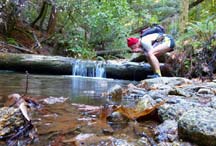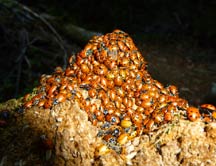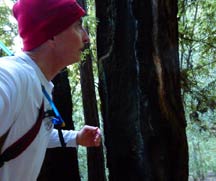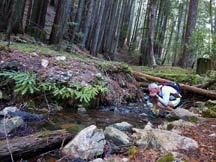
This has become my favorite run for the past several months. It's less crowded in the upper trails than Nicene Marks, and has ~no mountain bikers to ruin the wonderful silence and nature sounds of the forest. It's also quite steep, which is good training for the Pikes Peak Half Marathon Ascent which I'm trying to qualify for. My route was to start at the parking lot on Felton-Empire Rd, run down to Fall Creek, then up the creek trail to the final crossing, then switchback up to the Big Ben Tree, then right on up to Empire Grade, then a quarter mile of running on Empire Grade itself, to another trail which takes me back to a trail junction, back to the Big Ben Tree, and then down to the Limestone Kilns, and back down to Fall Creek. It's about 10 miles, including the loop up to Empire Grade. Here's the trail map. and here.

It's been a very dry year, but Fall Creek is still running, and the cold water was perfect after a couple of miles of running up.
|

A mountain of lady bugs, huddling to stay warm this January morning
|

At the turn onto the Big Ben trail, a fallen, split redwood reveals its heartwood core - rendered here as a frescoe in Photoshop
|

I pause, halfway up, for half a sandwich
|
 |

A final sip. This time from south Fall Creek below the ruins of the lime kilns |
I had a touch of melancholy, this time, running through these ancient giants. It was bone dry except for the streams. My steps kicked up dust when they should have been splashing in little puddles this time of year. While the trees themselves are, with rare exceptions nowadays, only 100 years old, the old growth such as the Big Ben Tree may be up to 2,000 years old. And the root systems which give rise to new "shoots" may date back to the end of the last Ice Age ~12,000 years ago or more. Redwoods are nourished by the fog which hugs these mountains so often. But new research (Sherwood et al. 2013, see here) indicate that climate change will likely result in a reduction in low clouds, as the hotter temperatures enhance convective "mixing out" of the marine layer so prominent along the west coast of North America and other places. How will this affect the future of our redwoods, given that climate change temperatures are irreversible, even after CO2 increases halt? Chain saws only hurt the forest temporarily, but rising CO2 greenhouse warming hurts essentially permanently. The first, is obvious and we've made state parks such as Fall Creek to prevent this in the future. But the less visible effects of climate, the average voter seems to care little about.






